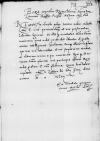Letter #3127
Bona Sforza to Ioannes DANTISCUSZator, 1547-06-16
| received Heilsberg (Lidzbark Warmiński), 1547-06-26 Manuscript sources:
| ||||
Text & apparatus & commentaryPlain textText & commentaryText & apparatus
Reverendissimo in Christo Patri, domino
Reverendissime in Christo Pater sincere nobis dilecte.
Litteras Paternitatis Vestrae, quotienscumque ad nos perferuntur, libenter legimus ex illisque novitates externarum nationum, quas nobis perscribit, libenter et grato animo intelligimus. Hortamur denique illam coeptam operam non intermittat, ad nos frequentius scribat ac novarum rerum, si quae emerserint digneque ad notitiam nostram fuerint, nos participes efficiat. Rem nobis gratam Paternitas Vestra factura. Quam bene valere cupimus.
Datae in
Ex mandato proprio sacrae reginalis maiestatis

